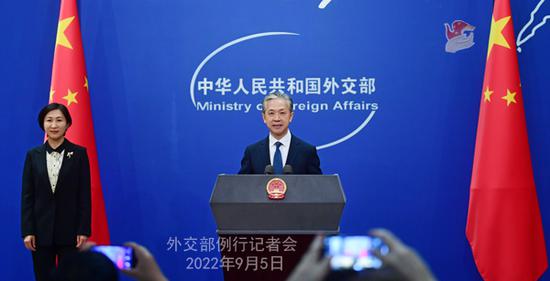
Chinese Foreign Ministry spokesman Wang Wenbin (R) introduces Mao Ning (L), new Foreign Ministry Spokesperson, to the media at the regular press conference on Sept. 5, 2022. (Photo/fmprc.gov.cn)
The following is the full text of the press conference on Sept. 5.
Wang Wenbin: Good afternoon, friends from the media. I am here today not to give the press conference, but to introduce a new colleague. Due to an important schedule change, Assistant Foreign Minister Hua Chunying could not join us today and has asked me to do the introduction in her stead. Let me present Ms. Mao Ning, new Foreign Ministry Spokesperson and Deputy Director-General of the Information Department. Mao Ning has been a member of the foreign service for 27 years with a long previous focus on Asia. She is a seasoned diplomat and fine communicator. I have no doubt she will soon form good working relations with Chinese and foreign friends from the media. It is also our hope that you will support her as you have supported each spokesperson before her. I now give the floor to Deputy Director-General Mao.
Mao Ning: Good afternoon, friends from the media. I'm deeply honored to become the 33rd Spokesperson of the Foreign Ministry. It's a great pleasure to get to know everyone from this platform. For me, this is a whole new experience. I will be learning from my fellow spokespersons and predecessors and join my colleagues in presenting China’s foreign policy and the thinking behind our foreign policy in a timely and accurate way. I'll be committed to promoting mutual understanding between China and the rest of the world. I'll give my best effort to the preparation for each press conference, reach out to each friend from the media with sincerity, and take every question seriously. I look forward to having sound communication and cooperation with you and hope to receive your support. Thank you.
CCTV: Today is the last day of the 2022 China International Fair for Trade in Services (CIFTIS). Last week, the foreign ministry spokesperson shared China’s consideration behind hosting the event. Do you have any further information?
Mao Ning: CIFTIS has attracted much attention from Chinese and foreign media over the past couple of days. It is learned that 446 Global Fortune 500 companies and other industry leaders, and 71 countries and international organizations have participated in the Fair. With a broad range of exhibits that focus on green development and highlights cutting-edge technologies, CIFTIS proves itself to be a professional, market-oriented and international event and serves as an important platform for promoting the development of global services trade. It has received recognition from Chinese and foreign participants.
CIFTIS is an epitome of China’s high-level opening-up. In the past decade or so, China’s trade in services has continued to expand, with an average annual growth rate of 6.1% in imports and exports, 3.1 percentage points higher than the global growth rate. China’s total value of trade in services has been the second largest in the world for eight consecutive years. Over the past decade, China's accumulated import value of services has surpassed $4 trillion. We are service trade partners with over 200 countries and regions and counting. China's trade in services enjoys broad prospects and numerous opportunities and will bring more opportunities and make greater contribution to the development of world trade in services.
As the curtain falls on this year's CIFTIS, China will continue to pursue high-level opening-up. We will continue to promote international economic and trade cooperation, work with countries to uphold true multilateralism, uphold the principles of inclusiveness and win-win cooperation, and jointly advance open and shared service economy to inject impetus into world economic recovery and development.
Shenzhen TV: According to reports, a number of China-assisted projects in South Pacific Island countries including Papua New Guinea, Samoa, Kiribati, Solomon Islands and Vanuatu have been started or completed. Can you share more information with us?
Mao Ning: As you said, quite many China-assisted projects in South Pacific Island countries have seen important progress recently. The Enga Provincial Hospital in Papua New Guinea and the China-Samoa Friendship Park in Samoa were handed over after completion. Renovation of Tobwaan te Rikirake Park in Kiribati, the Solomon Islands National University dormitory buildings project and Pentecost road project (phase one) in Vanuatu broke ground. Such progress is achieved thanks to close cooperation between China and the island countries despite the difficulties posed by COVID-19. It also signifies the implementation of the vision of building a community with a shared future for mankind.
China always follows the principle of mutual respect, equal treatment, win-win cooperation and openness and inclusiveness when developing relations with South Pacific Island countries. Our assistance to island countries is sincere and results-oriented with no political strings attached. For a long time, China has carried out a large number of assistance projects in island countries that are in line with their actual needs, which have effectively driven local economic development and improved people’s livelihood, and are thus widely welcomed by the governments and people of the island countries. China will continue to steadfastly strengthen practical cooperation in various fields with island countries so as to deliver more tangible benefits to the local people.
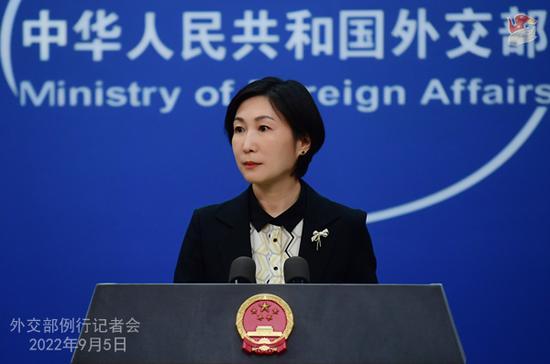
CGTN: On September 2, the U.S. decided to extend for another year the exercise of the Trading With the Enemy Act against Cuba. Cuban President Miguel Díaz-Canel said on Twitter that the U.S. dared not lift the Trading With the Enemy Act and used it as pretext to continue the blockade on Cuba. Cuban Foreign Minister Bruno Rodriguez tweeted that the U.S. ratifies the framework that supports the policy of abuse against Cuba and its people, which is rejected by almost all members of the international community. What’s you comment on this?
Mao Ning: We have noted relevant reports. The U.S.'s brutal and inhumane economic, financial and commercial embargo against Cuba over the past 60 years seriously violates international law and basic norms in international relations, infringes on Cuba’s right to stay a viable nation and pursue development and Cuban people’s basic human rights, and breaches the fundamental international humanitarianism. China firmly opposes this.
China always stands for respecting countries’ right to independently choose their social system and development path, firmly opposes unilateral sanctions imposed on countries, firmly supports the Cuban people in upholding their right to subsistence and development, and supports Cuba’s just cause of defending sovereignty and opposing embargo.
The United Nations General Assembly has overwhelmingly adopted the resolution urging the U.S. to end its economic, commercial and financial embargo against Cuba for 29 consecutive times. We call on the U.S. to heed the call for justice from the international community, abide by the purposes and principles of the UN Charter in handling its relations with Cuba, and fully lift the embargo on Cuba.
Associated Press of Pakistan: China has announced to provide additional RMB 300 million flood-relief supplies to Pakistan. Can you share some details here?
Mao Ning: Since the beginning of the floods, the Chinese side has stood with Pakistan and made every effort to provide relief assistance. Chinese leaders sent messages of sympathy to their Pakistani counterparts. The Chinese government promptly sent urgently-needed supplies including tents to Pakistan. The Red Cross Society of China offered donations to the Pakistan Red Crescent Society. Subnational governments, organizations and people in China have all expressed their sympathies and support in various ways. My colleagues have previously shared with you the details of those ongoing efforts.
Based on Pakistan's needs, the Chinese government has decided to provide additional disaster-relief supplies worth 300 million RMB on top of the 100 million RMB emergency humanitarian assistance. The Chinese side has put together 200 tonnes of vegetables and will deliver them via the Karakoram Highway as soon as possible. China Meteorological Administration provides Pakistan with weather forecast and technological support. A ruthless disaster can bring out the best of humanity. We are ready to maintain close communication and cooperation with the Pakistani side to fully implement all assistance arrangements and help the affected people overcome the floods and rebuild their homes.
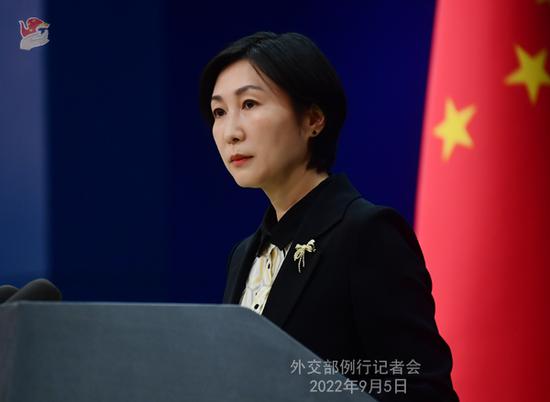
Bloomberg: The U.S. administration is considering moves that would restrict U.S. investment in Chinese technology companies. Does the foreign ministry have any comment on this?
Mao Ning: I’ve seen relevant reports. They mentioned that the U.S. would use government power to cripple Chinese companies. This is quite concerning.
The purpose of science and technology is to advance humanity’s common welfare rather than curb or contain any particular country’s development. The U.S. has been stretching the concept of national security to hamper China-U.S. business ties and sci-tech exchanges. This is against the principle of market economy and international economic and trading rules. It undercuts global confidence in U.S. business environment and will backfire on the U.S.. The Chinese government will continue to firmly protect the legitimate and lawful rights and interests of Chinese companies.
NHK: The U.S. government has approved a new arms sale to Taiwan. What is China’s comment?
Mao Ning: U.S. arms sales to China’s Taiwan region are a blatant violation of the one-China principle and the provisions of the three China-U.S. joint communiqués, especially the August 17 Communiqué. The arms sales gravely undermine China’s sovereignty and security interests, severely harm China-U.S. relations and peace and stability in the Taiwan Strait, and send a gravely wrong signal to “Taiwan independence” separatist forces. China firmly opposes and strongly condemns them. We will take resolute and strong measures to firmly defend our own sovereignty and security interests.
For some time, the U.S. has repeatedly trampled on international law and basic norms in international relations and breached the U.S. leader’s political commitment of not supporting “Taiwan independence”. The U.S. side keeps distorting, fudging and hollowing out the one-China principle, deliberately makes provocations on the Taiwan question, and supports and connives at “Taiwan independence” separatist forces. The U.S. has an unshirkable responsibility for causing tensions to rise in the Taiwan Strait. China urges the U.S. to abide by the one-China principle and the provisions of the three China-U.S. joint communiqués, stop arms sales to Taiwan and military contact with Taiwan, stop creating new factors that could lead to tensions in the Taiwan Strait, stop seeking political manipulation with Taiwan-related issues, stop using Taiwan to contain China, and avoid going further down the wrong and dangerous path.
I want to once again make it clear to the U.S. side that Taiwan is China’s Taiwan. The Taiwan question brooks no external interference. No individual or force can halt the historic process of China’s complete reunification.
RIA Novosti: Last Friday, the G7 finance ministers agreed to introduce a price cap for Russian oil and call on all countries to join the initiative. I wonder if China is considering joining this move?
Mao Ning: Oil is a global commodity. Ensuring global energy supply security is vitally important. We hope relevant countries will make constructive efforts to help ease the situation through dialogue and consultation, instead of doing the opposite.
Hubei Media Group: According to media reports, the Center for European Policy Analysis (CEPA), a U.S. think tank, recently published a series of reports commissioned by the U.S. Department of State. The reports analyze what is termed “the Chinese Communist Party’s malign influence operations” in Central and Eastern Europe. What does China think of the release of the reports at the tenth anniversary of the launch of Cooperation between China and Central and Eastern European Countries (China-CEEC Cooperation)?
Mao Ning: We have noted this series of reports and the fact that they were drafted and released — and I quote — “with the generous support of the U.S. Department of State”. This in itself is quite revealing. These reports are filled with denigration and groundless accusations against China-CEEC relations. They are neither objective nor factual.
China and CEECs enjoy a long-standing traditional friendship. China-CEEC Cooperation is a trans-regional platform for practical cooperation built by the two sides based on common need for development. Since its establishment a decade ago, China-CEEC Cooperation has remained committed to the focus on practical cooperation, the principle of extensive consultation, joint contribution, openness and inclusiveness, and its position of being a part of and useful complement to China-EU relations. Cooperation mechanisms have been put in place in more than 20 areas including trade, investment, connectivity, tourism, epidemic response, among others. The platform has yielded fruitful outcomes and delivered benefits to all participating sides. The average annual growth rate for China-CEEC trade over the past decade stands at 8%, much higher than that of China-EU trade. Major projects such as the Budapest-Belgrade Railway, the Peljesac Bridge, and the Piraeus Port have all brought tangible benefits to the local people. China has no geopolitical agenda in Central and Eastern Europe. We always oppose politicizing and ideologizing cooperation. We believe the people in Central and Eastern Europe can see clearly the malicious intention of sabotaging China-CEEC cooperation behind all the lies and disinformation.
Bloomberg: The U.S. administration will allow tariffs from the previous administration on hundreds of billions of dollars’ worth of Chinese merchandise to continue while it does a review of the need for such duties. Does the foreign ministry have any comment on this?
Mao Ning: We have noted relevant reports and would like to refer you to competent authorities in China for your specific question. Let me stress that to engage in economic and trade cooperation is a win-win for both China and the U.S.. There is no winner in a trade war or a tariff war. Section 301 tariffs imposed unilaterally by the U.S. on China violate WTO rules and do no good for China, the U.S. or the world.
Global Times: Today, China’s National Computer Virus Emergency Response Center (CVERC) and cybersecurity company 360 respectively released investigation reports on the attacks on Northwestern Polytechnical University from the U.S. National Security Agency (NSA), which showed that the NSA-affiliated TAO mounted hundreds of thousands malicious cyber attacks targeting Chinese objectives. What is China’s comment?
Mao Ning: The investigative reports you mentioned point to another example of the U.S. government’s cyber attacks on China.
Based on the analysis and tracing done by the joint team of CVERC and 360, the NSA’s cyber attacks and data theft against China are supported by a clear and complete chain of evidence, which involves 13 personnel in the U.S. who directly launched cyber attacks against China, and more than 60 contracts and more than 170 digital documents with U.S. telecom operators to build an environment for cyber attacks. The reports showed that the U.S. used 41 specialized cyber weapons to launch cyber theft operations for over 1,000 times against Northwestern Polytechnical University and stole core technical data. The U.S. has also long carried out indiscriminate audio surveillance against Chinese cell-phone users, illegally stole text messages from them and conducted wireless positioning of them.
The U.S.’s behavior pose a serious danger to China’s national security and citizens’ personal information security. China strongly condemns this and asks the U.S. side to offer an explanation and immediately stop its unlawful moves.
I want to stress that security of the cyber space is a common issue facing all countries in the world. As the country that possesses the most powerful cyber technologies and capabilities, the U.S. should immediately stop using its prowess as an advantage to conduct theft and attacks against other countries, responsibly participate in global cyber space governance and play a constructive role in defending cyber security.
China News Service: A follow-up on the cyberattack on China’s Northwestern Polytechnical University by the U.S. National Security Agency. What measures will China take to better protect its cybersecurity?
Mao Ning: This case of cyberattack on China’s Northwestern Polytechnical University by the U.S. National Security Agency once again shows that safeguarding national cybersecurity is extremely important. As a major victim of hacking attacks, China is firmly opposed to all forms of cyberattacks. China’s laws clearly prohibit all cyber intrusions and damage of information systems.
In recent years, China has accelerated top-level design for cybersecurity, formulated and improved strategic planning and legal system in the field of cybersecurity, and continuously enhanced its capacity in cybersecurity protection and cyberspace law enforcement. The Chinese people’s awareness of cybersecurity has also been continuously raised. This week is the 2022 China Cybersecurity Week. We believe that relevant activities will further enhance the cybersecurity awareness and protection capacity of the whole society, in an effort to build a strong line of defense and create a secure cyberspace.
Cybersecurity threats are a common challenge faced by all countries, and safeguarding cybersecurity is the shared responsibility of the international community. China adheres to peaceful use of cyberspace, and is ready to work with the international community to step up dialogue and cooperation, oppose hegemony in cyberspace, address all kinds of hacking attacks, maintain peace, security, openness, cooperation and order in cyberspace, foster a multilateral, democratic and transparent international Internet governance system, and work together for a community with a shared future in cyberspace.









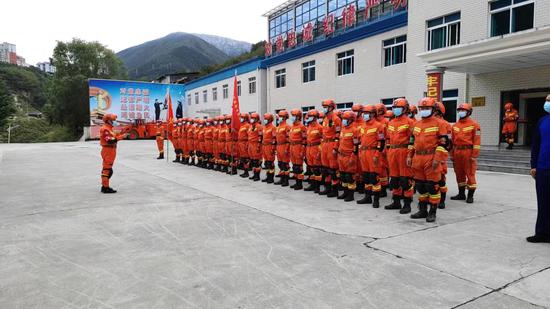





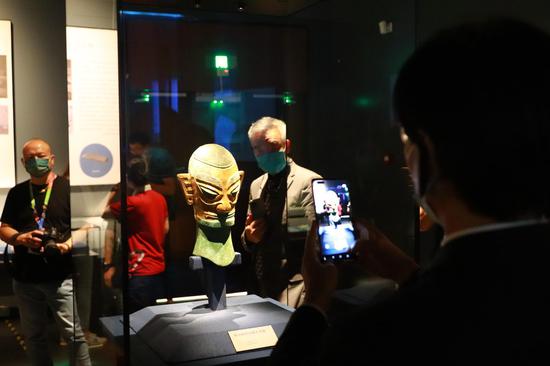
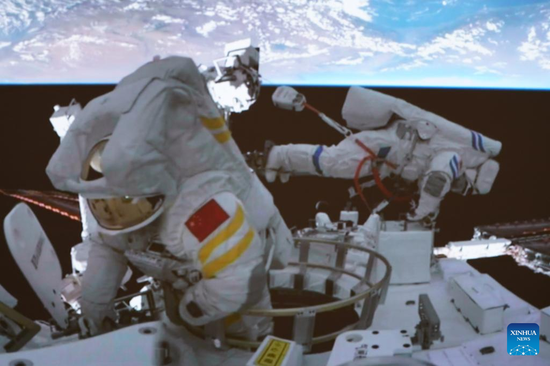





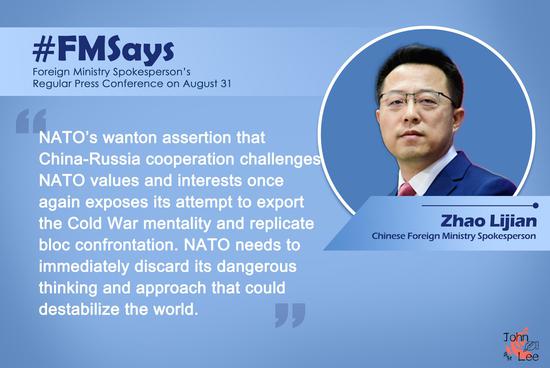
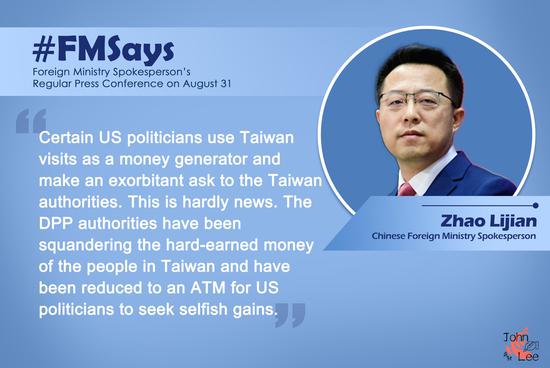



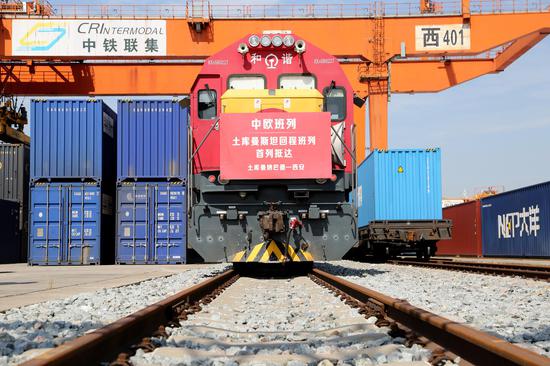
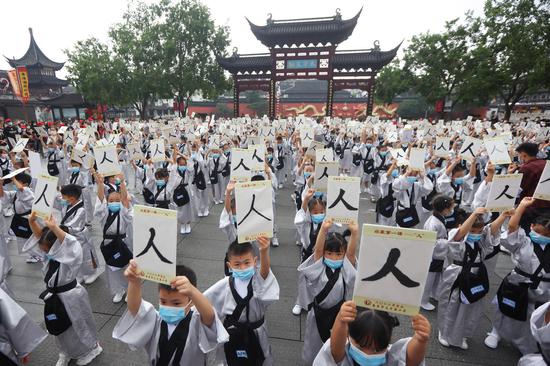

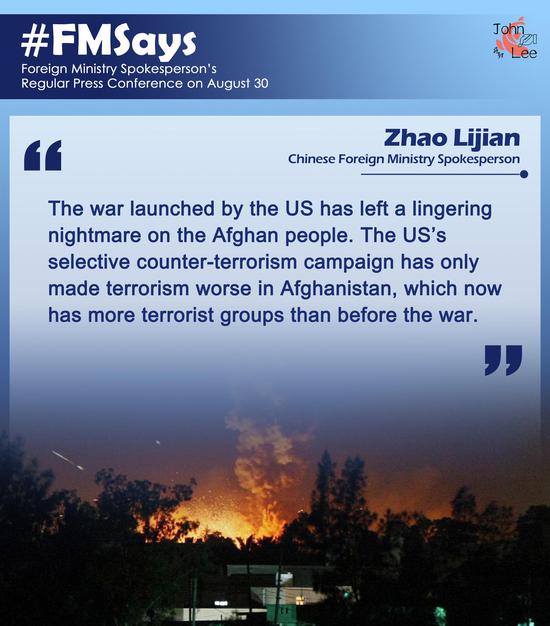
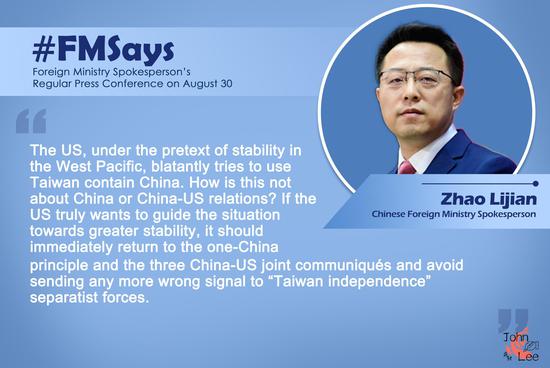
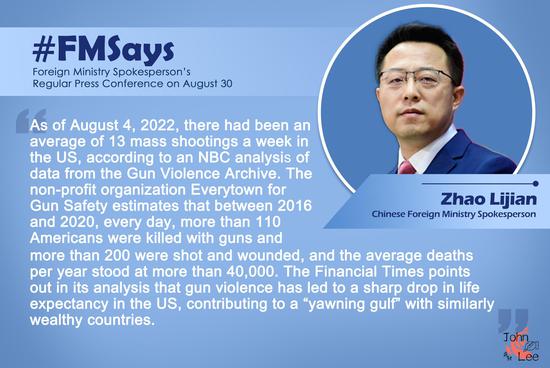

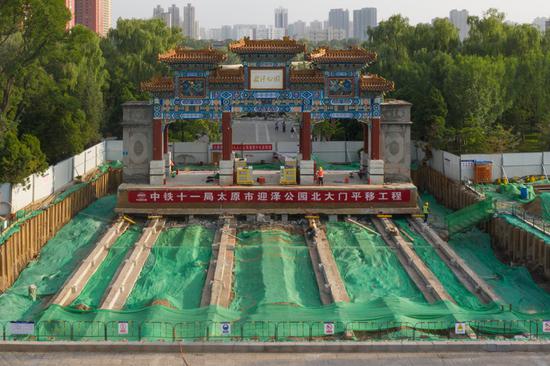
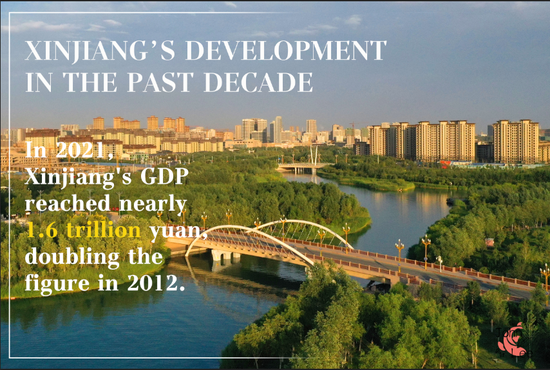
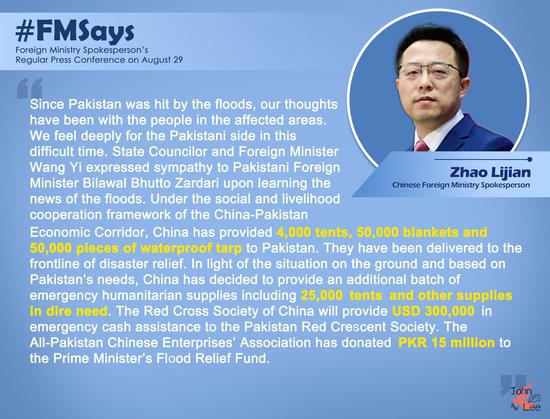
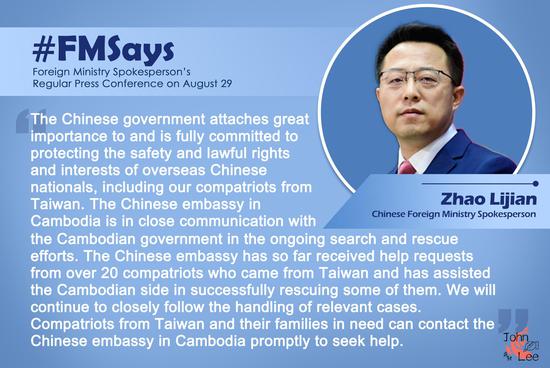





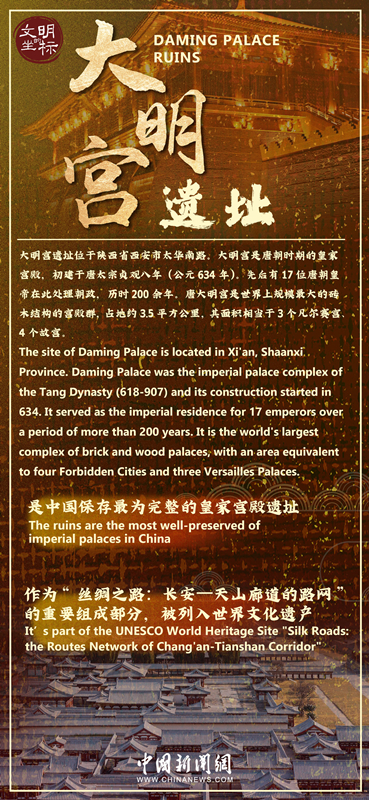






 京公网安备 11010202009201号
京公网安备 11010202009201号